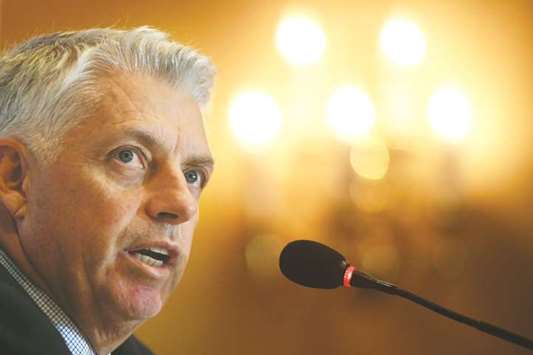Australian players.
International Cricket Council chief executive Dave Richardson said football-style red and yellow cards would be among the measures considered as it seeks to bring back a “culture of respect” to the game.
The leaders of top playing nations demanded harsher punishment and more powers for umpires to act against cheating and misconduct at ICC meetings in the eastern Indian city of Kolkata this week.
“There was clear direction received that we want to move toward stricter and heavier sanctions for ball tampering and all other offences that are indicative of a lack of respect,” he told a press conference.
Ex-Indian Test star Anil Kumble is to lead a player legends committee to recommend the sanctions. The ICC chief said the new punishments would be decided in June and July.
Richardson said the punishments would also cover “other offences that are indicative of a lack of respect for your opponent, for the game, the umpires”.
“We want penalties in place that are a proper deterrent. Fines are not proving to be the answer,” he said. The ICC was criticised after it banned Australia skipper Steve Smith for only one Test over his role in the ball-tampering scandal in South Africa last month in which batsman Cameron Bancroft was caught trying to alter the ball. After a wave of public anger, Cricket Australia later banned Smith and his deputy David Warner for 12 months. Bancroft was given a nine-month suspension.
“Quite honestly we were worried about poor player behaviour before that,” said Richardson. “There have just been too many incidents of sledging, ugly abusive language and dissent.”
He said letting umpires send off and book players “will be part of the discussion. “When it comes to time wasting and things like that we want the umpires to take more on-field actions.”
Richardson said he was not convinced that red and yellow cards “will be as easy to implement as in other sports”.
Umpires have since last year already been able to send off players for violence and other extreme behaviour but this has not yet been used.
England begin World Cup quest against S. Africa
Hosts England will begin their quest for a maiden 50-overs World Cup title against perennial under-achievers South Africa on May 30 next year with Lord’s staging the final on July 14, the International Cricket Council (ICC) announced yesterday.
One-day cricket’s most coveted trophy has eluded three-times finalists England who staged the first three World Cups between 1975-1983 and also in 1999.
England could not advance beyond the group stage of the 2015 edition but have since grown into a formidable ODI outfit, rekindling hopes of breaking their World Cup duck on home soil.
They begin against a South Africa side who have never been beyond the semi-finals.
Ashes rivals Australia, currently recovering from a ball-tampering scandal, will begin their title defence against plucky qualifiers Afghanistan on June 1 at Bristol.
Cricket Australia is searching for a new one-day captain after slapping 12-month bans on former skipper Steve Smith and his deputy David Warner following last month’s fiasco in South Africa.
While both will be free to play in the tournament, Smith has also been barred from captaincy for two years, while Warner will not be considered for any leadership role again. Old Trafford will host the 10-team tournament’s most-anticipated match on June 16 between Asian arch-rivals India and Pakistan. The collapse of bilateral cricket between the bitter South Asian neighbours means their fans can only watch them in ICC events.
“Because of the UK’s diverse population, every competing team will also be guaranteed a ‘home crowd’ every time they play at some of the most iconic cricket grounds in the world,” the tournament’s managing director Steve Elworthy said in a
statement.
“The Cricket World Cup is the third most watched global event and has huge interest and appeal among cricket fans. Our ambition is to grow the game and deliver the greatest ever cricket celebration...,” he added.
The 46-day tournament will be played across 11 venues in England and Wales with Manchester’s Old Trafford venue hosting six matches. The tournament will follow its 1992 format with all 10 teams playing each other in the round-robin league to determine the four teams who will advance to the semi-finals at Old Trafford and Edgbaston. Lord’s will host a World Cup final for the fifth time.
“We know from previous ICC events that every country will be proudly supported at each of the venues creating an exceptional atmosphere and a real celebration of the game,” ICC chief executive Dave Richardson said.

